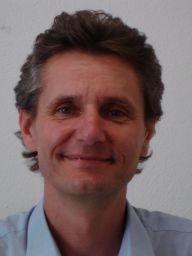- Accueil
- Institut Néel
- Équipes de recherche
- Pôles & Services techniques
- Travailler à l’institut
- Partenariats
- Actualités
- Agenda
- Annuaire

Etienne GHEERAERT graduated from the école normale supérieure de Cachan, France, in electrical engineering, then prepared a PhD at university Joseph Fourier in micro-electronics. He entered this university in 1992 as assistant professor and was nominated professor in 2004. In 1998-1999 he worked at the National Institute for Materials Science, Tsukuba, Japan, and from April 2006 to September 2008 he was attaché for science and technology at the Embassy of France in Japan in charge of scientific survey and promotion of the scientific collaboration in the field of Engineering, Energy and Environment. He is now exceptional class professor at Université Grenoble Alpes, member of the wide bandgap semiconductor group at Institut Néel (CNRS and Université Grenoble Alpes). He created in 2015 the Néel-NIMS for Nanosciences (3N-Lab) international laboratory between Grenoble and Tsukuba, and was co-director for 5 years. Recently he contributed to the creation in 2022 of the Japanese-French Laboratory for Semiconductor Physics and Technology (J-FAST), located in Tsukuba, as a joint lab between CNRS, Université Grenoble Alpes, Grenoble INP-UGA, University of Tsukuba and Air Liquide Laboratories. He is also part-time professor at university of Tsukuba since 2016.
He co-authored more than 140 articles in international journal (h-index=31, WoS), 5 patents, and has supervised 16 PhD, and 2 more in progress.
His main research achievement is the development of a new electronic devices with diamond. This material is well known since the middle age, but its fabrication required extreme conditions until the 70’s, when researchers from Tsukuba developed a low pressure growth technique similar to regular semiconductor processes. Since that breakthrough, scientific interest in the community grew exponentially, leading to technology developments in quantum technology, biosensors, particle detectors and jewellery. Diamond material has long been considered the ultimate semiconductor material for high performance devices, but because physics and technology challenges no device was available.
Based on his scientific achievements in the physics and technology of diamond, in particular the control of electronic properties of diamond with doping, Pr Gheeraert built in 2015 a European consortium of 15 leading research labs and companies to tackle the main challenges, and led the ‘GreenDiamond’ H2020 European project for 5 years. The consortium gathered a wide range of specialists, from basic physics to electrical engineering, and was able to propose power converter dedicated to renewable energies with a four times higher efficiency than regular converters. This was the largest international collaboration for diamond electronic devices. Following this successful project, Pr Gheeraert co-funded in 2019 the DiamFab startup, the first worldwide provider of diamond epilayers for electronic applications. He was awarded in December 2021 the “European Star” of the French Ministry of Higher Education and Research.
Beside his research activity at Institut Néel and University of Tsukuba, he is also Deputy director of Polytech Grenoble in charge of research, and gives lectures at Polytech Grenoble, Phelma and University of Tsukuba.